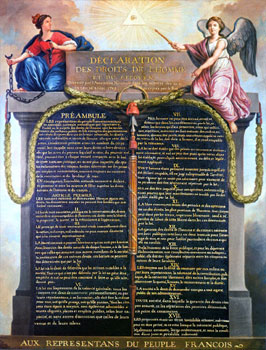|
 The
French Revolution is an unfortunate example
of the difficulty of manifesting lofty
ideals as practical reality. In 18th century
French society, the aristocracy had everything,
including rights and possessions, but
the majority of the population had barely
enough to survive. Influenced by the writings
of the philosophers of the Enlightenment,
many different groups in France, with
very different interests, joined together
to wage a "revolution of equality." Women,
for example, played a major role in the
revolution, fighting side by side with
men. Historically, throughout Europe women
had little rights and freedoms, but the
writers of the Enlightenment put forth
the revolutionary idea that all people
are created equal and should enjoy equal
rights - men and women! This was the spirit
of the Revolution, but when the aristocracy
was overthrown and the new government
was being formed, various groups vied
for control, and the outcome, although
a significant milestone forward, was not
what many expected. The
French Revolution is an unfortunate example
of the difficulty of manifesting lofty
ideals as practical reality. In 18th century
French society, the aristocracy had everything,
including rights and possessions, but
the majority of the population had barely
enough to survive. Influenced by the writings
of the philosophers of the Enlightenment,
many different groups in France, with
very different interests, joined together
to wage a "revolution of equality." Women,
for example, played a major role in the
revolution, fighting side by side with
men. Historically, throughout Europe women
had little rights and freedoms, but the
writers of the Enlightenment put forth
the revolutionary idea that all people
are created equal and should enjoy equal
rights - men and women! This was the spirit
of the Revolution, but when the aristocracy
was overthrown and the new government
was being formed, various groups vied
for control, and the outcome, although
a significant milestone forward, was not
what many expected.
The
Declaration of the Rights of Man and
of the Citizen was the first step
in writing a new constitution, and it
codified the ideals of the Enlightenment
by enumerating the specific natural rights
to which all men, who are born free, are
entitled. However, the rights pointed
out in this document, adopted in 1789
(the same year as the similar American
Bill of Rights), were meant only for free
men, not slaves and not women. The women
leaders of the Revolution were naturally
outraged. Olympe de Gouges, one of the
most outspoken of these, drafted a mirror
document, Declaration of the Rights
of Woman and the Female Citizen, and
fought to have women's rights included
in the new constitution. She and others
were executed, and it would be more than
a century before the lofty ideals of the
Enlightenment were realized, and French
women were granted equal rights with men.
|